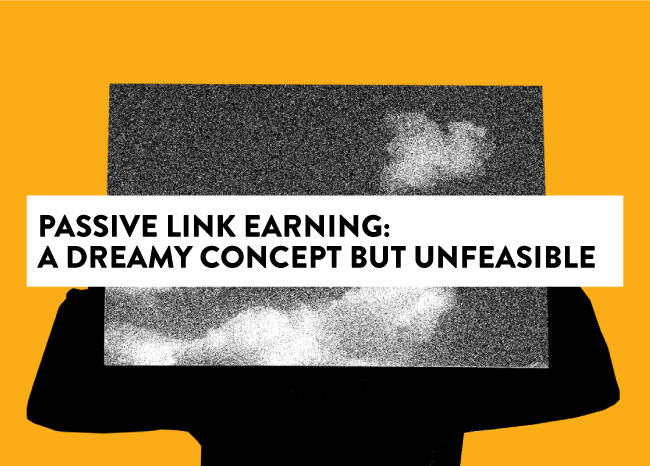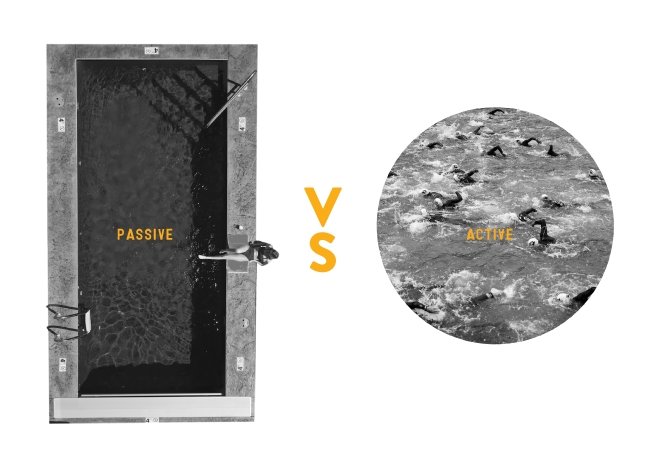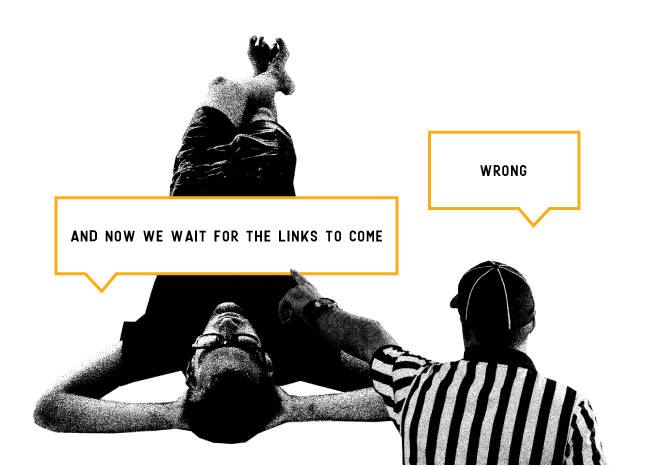
You've gone to school, gotten your degree, and gained marketable skills. Now, you’re in the market for a job. It’s time to sit back and let multiple companies come to you and let the job offers roll in. Sound wrong? That's because this is not how getting a job works in the real world.
Passive link earning is just the same. Passive link earning is the idea that if you have good content, people will link to it without any human-driven link building effort. The thought is that if your content is good enough, it will earn links on its own.
Passive link earning sounds excellent in theory, but it's not sensible. It is unwise to rely on passive link earning alone for many reasons (which I’ll explain later). You need quality links if you want your site to perform and rank in the search engine results pages (SERPs). The competition for top search engine spots is too fierce to rely on passive link building alone. You need to be proactive and build links yourself.
There are many ways to build links organically. Getting started on the work yourself is crucial, not waiting for others to do it for you.
Passive vs. Active Link Building

There is one key difference between passive and active link building. With active link building, you actively go out and seek links from other websites.
Active link building is done by manual outreach to webmasters with sites related to your industry, niche, and/or target audience. If you've done your research, the site should mention a topic or be relevant to something you have a great informational page on. It would be an easy and natural fit to link to your page and will support their content by providing readers with more information they might be interested in.
With passive link building, you hope to create content good enough that others will find it and link to it entirely on their own. While you may have some success with this, you will likely need to consider several other link building strategies.
The reality is that even if you have the best content in the world, it will not automatically generate links. For your content to earn links successfully and consistently, you must actively promote it.
What Passive and Active Link Building Have in Common
One commonality between active and passive link building is essential for success with either method: great content.
Creating great content is the foundation of any good link building strategy, whether it is active or passive. If you want people to link to your site, you need to give them a reason to do so. The best way to do this is by creating high-quality, informative content that will be of value to you, webmasters, and readers interested in relevant topical and industry spaces.
No one is obligated to link to your site. If they are, chances are you are operating under black hat practices. Making your content worthy of links will be crucial for any organic link building that follows best SEO practices.
Why Relying on Passive Link Building Won’t Work

Your site or page must be visible for people to find it and link to it. Visibility will primarily require great content, which you may already have. But, visibility in search will also require links to your site or page. Do you see the problem here?
Your site will likely not be visible in the SERPs if it doesn't have links, so how are people supposed to link to it if it is not visible (i.e., if you are sitting back waiting to get the links you need to be visible)? If you're not actively working on getting links, it is likely that your site will not earn any of its own accord.
Brand Engagement Doesn’t Equate to Links
Of course, wide readership, social media, people who know and search for your brand, and those who routinely visit your site are also options to increase your visibility. However, passive links alone won’t get you to where you want to be as these other means do not automatically equate to links — and each amounts to its own intensive marketing campaign to deliver meaningful results.
For optimal performance in organic search, your backlink profile needs to accurately reflect the relevancy and relationships of your content to perform well in related spaces. You have much more control over this when manually promoting your content (i.e. active link building).
Building Relationships Doesn’t Automatically Build Links
You must put in the work to establish E-A-T, which involves acquiring quality, relevant links. You'll roadblock yourself if you think this is going to happen passively. For instance, if your business gets written up in a prominent news article, wouldn’t you want them to link to your site? Or if you are a non profit, you would want all the partners and donors you’ve worked with to link to your website from theirs to establish that relationship. Even if a relevant industry blog publishes a great article about businesses or sites close to yours, you would want to be mentioned and linked to as well.
While you may actively be building relationships and engaging with customers, partners, and other industry leaders, links that reflect this engagement likely won’t happen automatically, so you will have to go out and make those links happen. Aside from this dilemma, there are more hazards to relying on passive links alone.
No Control Over Links
When you rely on others to link to your content, you have no control over what they say or how they say it. You could have the best, most informative article on a topic, but if the webmaster linking to it uses poor anchor text or writes a poor article, it could reflect negatively on your site.
Volatile Link Growth
Low-quality sites will likely passively link to your site. Link growth can be volatile when you're not actively working to establish quality links. You could have a great month of link growth but, the following month, see all those links disappear. This could be due to the webmasters taking them down and/or the links no longer being indexed by search engines — which is a significant possibility with low-quality sites.
Inaccurate Metrics
When relying on passive link building alone, you may struggle to accurately measure your backlink profile. You will not know if the links are follow or nofollow, if they're editorially given or paid for, what the anchor text is, or if they come from something unsavory that you would rather not be associated with. All these factors play into the quality of a link and can impact your rankings. If you're trying to understand the quality of your links and where they're coming from, you'll need more than just raw link numbers with passive links.
While some of these variables and limitations may be unavoidable in the modern online ecosystem, you have much more control over them when you actively, thoughtfully pursue backlinks.
Erratic Backlink Profile
If you have no control over who links to you passively, you will have no means to manage the quality of those links, and no influence over the context. This can lead to an erratic backlink profile, which you want to avoid. An inconsistent backlink profile looks suspicious to search engines and can result in penalties.
It is natural to acquire at least some backlinks to your site passively. These links may be spammy or low-quality. However, doing the work to actively gain quality backlinks will offset these links and more to show search engines a diverse and robust backlink profile. Take porn, pills (pharmaceuticals), and poker (gambling) sites for example. These niches are notorious for spammy tactics. Links from these sites pointing to yours are dangerous for your backlink profile and site health overall, as it topically and semantically connects you to these, often spammy sites.
Passive Links May Be Nice, but You'll Need More

While it would be nice if we could all sit back and wait for links to come in passively, the truth is that link-building is still a process that requires dedication, time, and effort. If you're not actively working on acquiring links, it is likely that your site will not rank as well as it could. And in some cases, you may not even rank at all.
You'll need to supplement passive link acquisition with other methods if you want to see actual results from your link-building efforts. This doesn't mean that passive link building is worthless. But if you're only relying on this method, you're doing yourself a disservice.
Sites like Wikipedia, Forbes, and Investopedia garner lots of passive backlinks from low DA and low-quality sites because they’ve already established their E-A-T. They are too authoritative for a couple of spammy passive links to make a big impact on their performance. But, the everyday site may have significant issues.
Another large factor why these sites aren’t being affected by low DA sites is relevance. Whenever someone passively links to these sites, it is almost always relevant to the content being linked to. The quality of these relevant links mean much more — as not all low DA sites are low-quality, they could just be new sites.
Relevance is essential to your backlink profile, and you have much more control over the relevance of your links, context of links, and anchor text, and even the sites you outreach when active link building. Your site must be authoritative, trustworthy, and expert enough to be visible. This will require a much more hands-on and detailed approach to content and link building. Only when you are visible will you earn enough passive links to supplement a healthy backlink profile.

